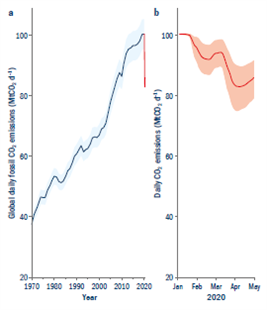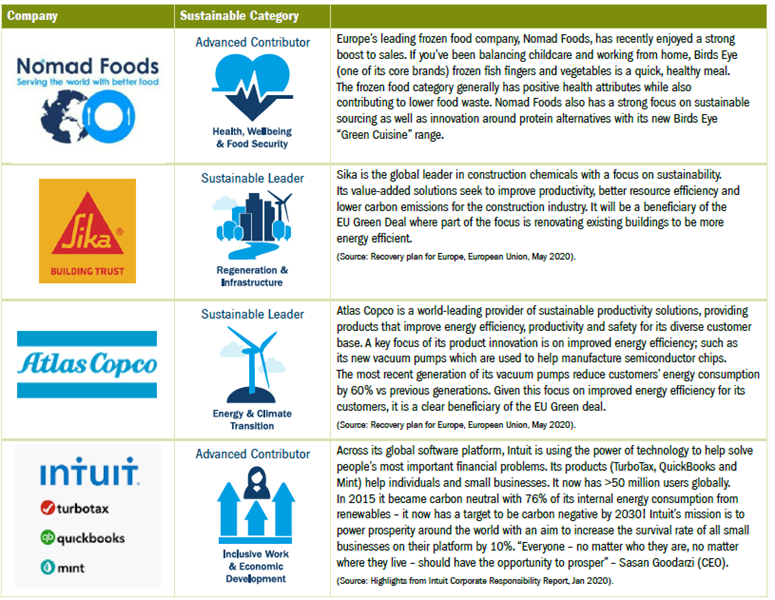Companies have also been coming under increased scrutiny during the pandemic of their treatment of workers, suppliers and local communities. Media allegations of worker exploitation at UK retailer Boohoo led to a customer boycott and a Twitter storm. The subsequent 49% collapse in Boohoo shares3 demonstrates how social factors such as poor labour and supply chain practices can have a real impact on financial valuations. Shares remained 24% down in mid-August, showing that the effects outlast the social media storm.
Ultimately, we’re seeing investor focus moving from not just the “E” (Environmental factors) in ESG but now also to the “S” (Social factors) with aspects such as supply chain transparency, employment policies and support for local communities increasingly impacting company reputation and values. In the Global Sustainable Outcomes strategy, we hope that by investing in companies positively contributing towards our social themes we can help create a more inclusive world.
Sustainable theme focus: a green recovery

Source: Source: Nature Climate Change, 19 May 2020.
Unfortunately, this clean air was temporary. The first thing I noticed when lockdown eased was how poisonous traffic fumes smelt. How much damage does this polluted air cause to our lungs and those of our children? If governments could react so swiftly to a deadly respiratory virus, why can’t they react as urgently when dealing with air pollution and climate change? It turns out that I wasn’t alone in this thinking. For many, this pandemic has highlighted just how fragile humans are and accentuated the sense of climate change urgency.
With major economies launching large fiscal stimulus programmes, governments have been given a once in a lifetime opportunity to recover and grow in a greener more sustainable way. Unfortunately, the world’s two superpowers and largest polluters, China and the United States, have focused instead on short-term economic recovery, with their programmes supporting polluting industries such as oil, gas and coal. But Europe and many other countries including the United Kingdom, South Korea and Japan are all seeking a different path to economic recovery, one which also focuses on tackling climate change. The UK government plans to invest nearly £1.3 billion in “green” building projects5 and provide £2 billion in energy efficiency grants to support jobs and the economy.6 They have also allocated nearly £350 million to help cut emissions from heavy industry, construction and transportation.7
European Green Deal which set an ambitious roadmap towards a climateneutral, circular economy. Instead of de-emphasising these long-term climate policies in favour of short-term economic intervention, the EU has instead placed this Green Deal at the centre of its recovery plans. The EU commission president, Ursula von der Leyen, stated “Sooner or later we will find a vaccine for the coronavirus. But there is no vaccine for climate change. Therefore [we] need a recovery plan designed for the future.”8 The EU Recovery Plan aims to kick-start an accelerated decarbonisation drive in Europe, bringing €1.8 trillion of investment in the next seven years. All of this will be aligned with climate Global Sustainable Outcomes | News & Views Q2 2020 | 3 Company Q2 2020 sustainable impact highlights Company Sustainable Category Advanced Contributor Europe’s leading frozen food company, Nomad Foods, has recently enjoyed a strong boost to sales. If you’ve been balancing childcare and working from home, Birds Eye (one of its core brands) frozen fish fingers and vegetables is a quick, healthy meal. The frozen food category generally has positive health attributes while also contributing to lower food waste. Nomad Foods also has a strong focus on sustainable sourcing as well as innovation around protein alternatives with its new Birds Eye “Green Cuisine” range. Sustainable Leader Sika is the global leader in construction chemicals with a focus on sustainability. Its value-added solutions seek to improve productivity, better resource efficiency and lower carbon emissions for the construction industry. It will be a beneficiary of the EU Green Deal where part of the focus is renovating existing buildings to be more energy efficient. (Source: Recovery plan for Europe, European Union, May 2020). Sustainable Leader Atlas Copco is a world-leading provider of sustainable productivity solutions, providing products that improve energy efficiency, productivity and safety for its diverse customer base. A key focus of its product innovation is on improved energy efficiency; such as its new vacuum pumps which are used to help manufacture semiconductor chips. The most recent generation of its vacuum pumps reduce customers’ energy consumption by 60% vs previous generations. Given this focus on improved energy efficiency for its customers, it is a clear beneficiary of the EU Green deal. (Source: Recovery plan for Europe, European Union, May 2020). Advanced Contributor Across its global software platform, Intuit is using the power of technology to help solve people’s most important financial problems. Its products (TurboTax, QuickBooks and Mint) help individuals and small businesses. It now has >50 million users globally. In 2015 it became carbon neutral with 76% of its internal energy consumption from renewables – it now has a target to be carbon negative by 2030! Intuit’s mission is to power prosperity around the world with an aim to increase the survival rate of all small businesses on their platform by 10%. “Everyone – no matter who they are, no matter where they live – should have the opportunity to prosper” – Sasan Goodarzi (CEO). (Source: Highlights from Intuit Corporate Responsibility Report, Jan 2020). Source: Columbia Threadneedle Investments analysis/internal reports, 13 August 2020. The mention of any specific shares or bonds should not be taken as a recommendation to deal. All intellectual property rights in the brands and logos in this slide are reserved by the respective owners. neutrality targets whilst 30% of the total funding, c.€550 billion, will be spent in climate-related projects.
Key beneficiaries of this spend will be sectors such as renewable energy, clean transportation, buildings renovation (targeting improved energy efficiency) and hydrogen, as these areas are helping to tackle carbon emissions. July saw the release of the EU’s “Hydrogen Strategy for a Climate Neutral Europe” which will likely accelerate the decline in costs for green hydrogen globally as well as helping Europe to become a leader in the field. Transitioning to a more circular economy is also a key part of the plan with the EU introducing a new plastic tax next year, which will favour companies providing alternatives to plastics as well as recycling solutions. Of course, creating jobs is a critical part of any recovery package with the EU plan aiming to create at least a million green jobs with support for workers in polluting industries to enter these new roles.
EU Climate Chief, Frans Timmermans, argues that a green shift will help create many more jobs, supporting stronger and more sustainable economic growth. Alongside the recovery package, the EU is also proposing to strengthen its 2030 target for emissions reduction from 40% to 55% based on 1990 levels.9 This level of ambition, if approved, would imply bigger cuts in emissions in the next 10 years than we have seen in the last 30! A Democratic win under Joe Biden will see the United States follow Europe’s lead. Biden has pledged to “build back better” in the US with $2 trillion for Clean Energy and Infrastructure Spending over four years.10 Of course, we’ll have to wait until November to find out if a Green US economic recovery will become a reality. We own several companies in the Global Sustainable Outcomes strategy which will benefit from these green recovery investments, including: Orsted (offshore wind); Samsung SDI (EV supply chain); Kingspan (building insulation) and Sika (energy efficient building materials); Trane Technologies (energy efficient heating and ventilation equipment) and Johnson Matthey (the hydrogen value chain).






